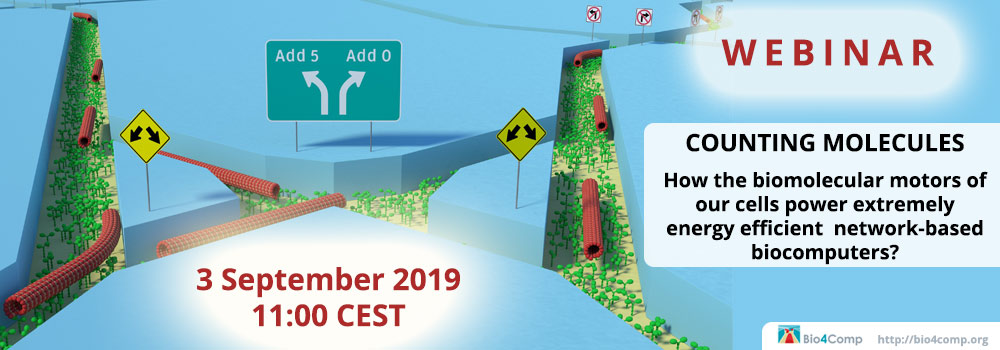Webinar: Counting molecules - How the biomolecular motors of our cells power extremely energy-efficient network-based biocomputers
Date: 3 September 2019, 11:00 CEST
Today’s computers use vast amounts of electric power – so much so that the inability to cool the processors actually hampers the development of more powerful computers. In addition, they cannot do two things at the same time, which affects the processing speed needed. There is an urgent need to increase computing power and decrease their energy consumption. Did you know that in 2015 the world’s data centers consumed more energy than the entire UK?
Now, imagine a high-performance computing cluster that runs on a few kilograms of biochemical fuel instead of megawatts of electrical power. This may sound like science fiction now, but in principle, it is actually possible, thanks to network-based biocomputing.
Biocomputing uses a system of organic molecules, such as proteins and DNA, to form complex calculations involving the processing, storage, and retrieval of data. This new technology can greatly reduce the energy consumption of computation is in high demand, while increasing at the same time their computing power. It is a promising technology that is turning into a viable alternative computing approach.
Researchers at the EU’s Horizon 2020 consortium Bio4Comp are working on next-generation biocomputers that can overcome the limitations of electrical computing by integrating DNA and microfluidics-based computation. But how can bio-molecules perform mathematical calculations?
Come join us at our webinar and find out. Register now!
Who should attend?
- People with interest in developing sustainable & energy-efficient computing approach, different from current ICT technology
- Bio-and nanotechnology experts that are interested in alternative uses of biomolecules
- Researchers in micro- and nanotechnologies that are interested in manufacturing and data readout
Why attend?
- Be inspired by the alternative use of biomolecules and nanofabrication for developing low-energy computing
- Find out about the latest developments in network-based biocomputation
- Engage in the “Biocomputing Network” and showcase your own work.
Agenda
11:00 - 11:05 - "Welcome & Introduction" – Gerda Rentschler, Lund University & http://bio4comp.org
11:05 – 11:25 - "What is network-based biocomputation" – Till Korten, TU Dresden & http://bio4comp.org
11:25– 11:40 - "Multiplication of gliding filaments" – Cordula Reuther, TU Dresden & http://bio4comp.org
11:40-11:55 – “Microscope free agent detection” – Roman Lyttleton, Lund University & http://bio4comp.org
11:55 – 12:00 - Q/A
Who are the speakers?
Dr. Till Korten, TU Dresden, expert in biophysics of single motor proteins and co-coordinator of the EC funded Horizon 2020 project Bio4Comp, will introduce to this concept of performing logical operations with motor proteins that explore physical networks.
Dr. Cordula Reuther, TU Dresden, expert in nanotechnological applications of molecular motor systems, specifically microtubules and kinesin motors. One challenge for scaling up network-based biocomputation is to increase the number of filaments as they pass through biocomputational networks. Here, Cordula will advise us of the latest results on multiplying microtubules.
Dr. Roman Lyttleton, Lund University, expert in integration of electrical detection systems with molecular motor assays will talk about recent developments in using field-effect transistors for detection of unbound agents for network-based biocomputation.
About: Bio4Comp is a project supported by the EU's Future and Emerging Technologies (FET) Horizon 2020 programme with an international team of researchers and technologists that are working together to run Bio4Comp interdisciplinary research project touching mathematics, biology, engineering and computation.









